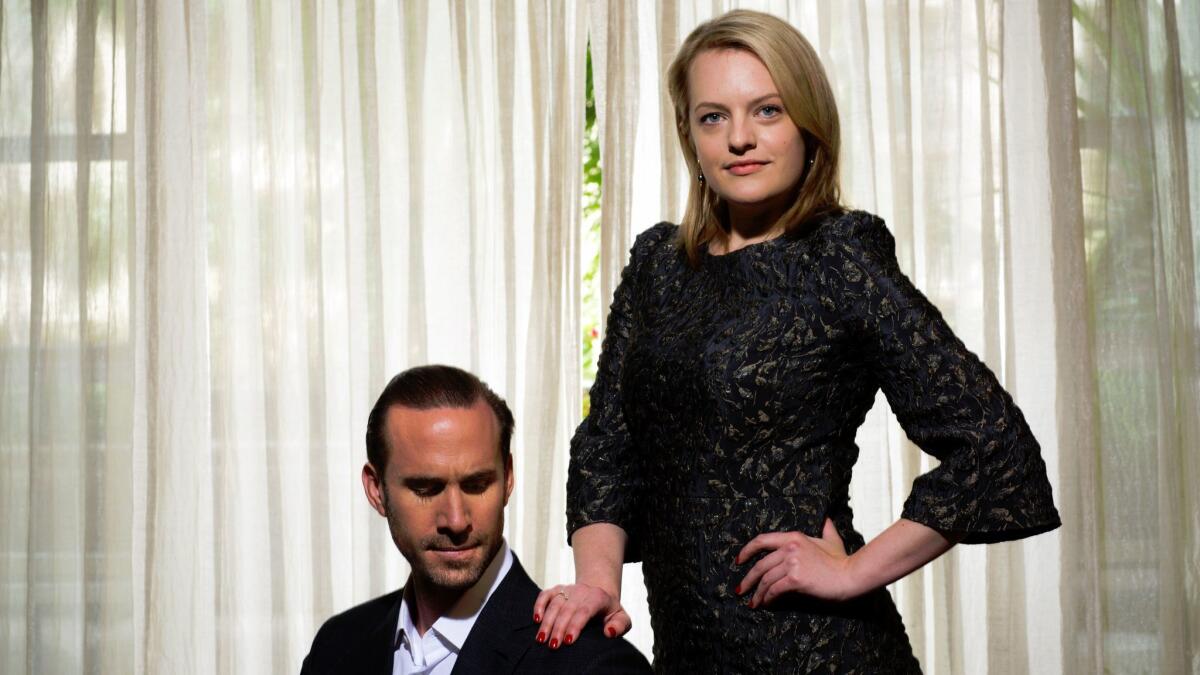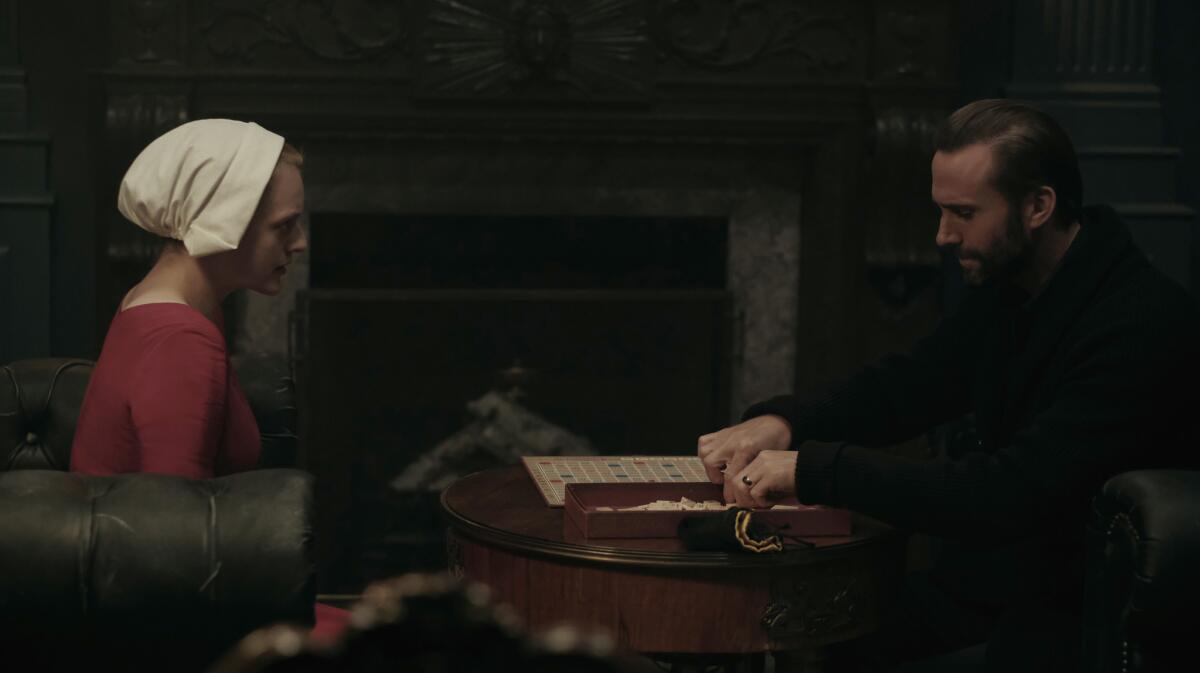Elisabeth Moss and Joseph Fiennes build the tension in the dark world of ‘The Handmaid’s Tale’

- Share via
In the dystopian Old-meets-New World Order of “The Handmaid’s Tale,” a totalitarian theocracy has taken over the United States. Women are now forbidden to read, vote or possess money. Because birth rates have plummeted, “handmaids” — fertile women who have committed “crimes against their gender” — are given the chance to redeem themselves by becoming breeders for ruling-class men and their wives.
That’s the situation in which Offred (Elisabeth Moss) meets Commander Fred Waterford (Joseph Fiennes) in the opening episode of the new
And that’s just the first few minutes of Episode 1. Let’s just say that the relationship between Offred (literally Of-Fred, she’s his property) and Waterford takes a few twists and turns over the season’s 10 episodes, giving Moss and Fiennes the opportunity to play a host of horrible, strange and uncomfortably intense scenes. Over coffee recently, we talked to them about their work together and the show’s scary relevance in
Let’s start with the Ceremony. Was it as awful and bizarre for you to shoot as it was for us to watch?
Moss: He had the hardest job in a way. I just had to lay there. (Laughs)
Fiennes: Male ejaculation. You’re going to bring that up, aren’t you?
Moss: I actually wasn’t going to bring it up. So you just totally [expletive] yourself. (Laughs) He got asked a question about male ejaculation earlier and I promised him today that I was going to bring it up in every interview. Ask him about his process with that. But I wasn’t going to embarrass you …
Fiennes: … until now. It was a question about how little it’s seen on screen versus female.
Moss: I don’t know about that …
Fiennes: Let’s not get into this!
Moss: You brought it up! But back to the question, it was important for us to show — besides the obvious things, like it’s clinical, it’s not sexy, that it’s absolutely brutal — that this is not an enjoyable experience for all three of them. The wife has to watch her husband have sex with somebody else. He has to have sex with someone other than his wife and perform and try to get her pregnant — though let’s face it, we probably feel the least bad for him in this scenario. And Offred has to be sexually assaulted.
Fiennes: There’s this weird moment between them, a flicker of eye contact. So much of this show is about touch and the lack of it. It’s a complex scene. However dominant this male-dominated state is, she’s a fertile woman. She holds all the cards.
Moss: Even if she lets him win at Scrabble.
When he invited Offred into his study in the second episode for that … that has to be the most intense board game ever played.
Fiennes: It’s Kubrick-esque in the tension. Just the sound design, the clacking of the tiles.
Moss: Him inviting Offred into the room is just a massive breaking of the rules. It was so much fun to play. Two actors in a room in front of a fireplace playing a board game. And it’s the most consuming thing you’ve ever seen.
Fiennes: It’s not Jenga. It’s not cards. It’s words. Atwood chose Scrabble for a reason. Women are not allowed to read in Gilead. So to put Scrabble on the table, it’s like food to someone starving. And he’s aware of that, so it’s a testing of the waters. The tension comes from language being stripped away. Just the smallest thing, a game of Scrabble, is monumental.
Between this and Neil Patrick Harris dreaming of “octopus and Scrabble” in “Gone Girl,” I’m wondering how Hasbro feels about these creepy guys championing their board game.
Moss: Oh, I totally feel an endorsement deal coming. “It’s a great icebreaker. Form friendships!”
Fiennes: “It’s gently competitive.”
Moss: Exactly. “Take your relationship to another level!”
Fiennes: What I love is how Offred is so intelligent in her choice of words, having to play this game of servitude and survival, allowing the man to win, which, in our culture, says so much about needing the guy to feel good.

See the most-read stories this hour »
There’s a lot of that kind of wry commentary. Waterford gives Offred a women’s magazine as a reward and she has this great voice-over thought about how to know your man’s into you, which takes on a far different meaning in Gilead.
Moss: It raises this argument about women’s place in the world and what it was then and what it is now. She talks about how it was all about how we looked, how thin we were, how successful we were at pleasing your man.
And then there’s that pre-Gilead flashback where you see the beginnings of society going to hell. The guy at the coffee place calling Offred and her best friend Moira “sluts” hit home when a man can brag about grabbing women by the genitals and still be elected president of the United States.
Moss: I know, right? We explored different reactions in that scene. I mean, if a waiter came up to me right now and called me a slut, I’d be looking at you guys and saying, “What?” I’d be so thoroughly in disbelief.
That flashback was to show a time when you weren’t supposed to say this, it was new, and people are making steps to use that kind of language. And it ties directly into what’s happened in this country. I can’t understand hearing the language that Trump has spoken and we’re OK with that.
Fiennes: You see it today with Serena Williams dealing with an abhorrent racial slur by a former No. 1 Romanian tennis player. Or an elected member of the European parliament saying women should earn less because they’re weaker and less intelligent. So the “slut” thing is all over the place. And it’s in places — a No. 1 tennis player, an elected member of the European parliament, a commander in chief — where it’s at the very top. And if it’s at the very top, then it filters down and makes it OK. And it is not OK.
Did Trump’s election change the way you thought about the material?
Moss: The day after the election, I was working with Joe all day. And it was … “surreal” is the word that I would use. Personally, I felt this sense of darkness that I didn’t anticipate. Everything seemed far too personal.
One of the scenes we did that day, one of my favorite scenes in the show, is when he says, “We were trying to make things better.” And I say, “Better ...” — I always get this quote wrong …
Fiennes: ”Better doesn’t always mean better for everyone. It means worse for some.”
Moss: Exactly. And I couldn’t help but feel a little dagger to the heart that I don’t know I would have felt if it was not that particular day.
Fiennes: I’m not American, but America has been a big part of my life. As an outsider, you look up to America. And when you have a commander in chief who uses misogynistic locker-room talk, it’s quite depressing. I have two daughters. What example is being set?
It’s interesting how “The Handmaid’s Tale” is popping up in the world as a reaction against this. You had signs at the women’s marches reading “The Handmaid’s Tale is not an instruction manual.” There were the women donning the red robes and white bonnets to protest an anti-abortion measure at the Texas Senate.
Fiennes: My jaw was on the ground when I saw that.
Moss: That’s an image that stands so clearly for feminism and women’s rights. I don’t know many costumes or outfits in literature that someone could wear into an assembly and you immediately know why they’re there and what side they’re on.
Fiennes: There’s such a power in the silence of those women, just sitting there.
I’m sensing we’re going to be seeing a lot of handmaids this Halloween.
Moss: It’s funny. I think about that. Boy, that’s a dark costume. When people dress up as handmaids, they’re dressing up as breeding slaves.
Fiennes: Walking wombs.
Moss: I’m sort of like, “OK. If you want to make a statement, then I’m all for it.” It’s not exactly a fun costume, you know. But I’ll support it for what it stands for.
And you guys should be well into filming a second season by then, right?
Moss: There’s so many questions I want answered! It’s a giant story. How did Gilead come about? What happened to Congress? What happened to the White House? We’ve never gone to the colonies. What do they look like?
It sounds like you’re talking about seasons two, three and four.
Fiennes: Do I need to get a condo in Toronto? [“The Handmaid’s Tale” is filmed in Canada.]
Moss: Just find an agent!
Twitter: @glennwhipp
ALSO:
Elisabeth Moss gets dystopian in 'The Handmaid's Tale'
From 'The Handmaid's Tale' to 'I Love Dick,' the female gaze is thriving on television
Q&A: Margaret Atwood answers the question: Is 'The Handmaid's Tale' a feminist book?
From the Oscars to the Emmys.
Get the Envelope newsletter for exclusive awards season coverage, behind-the-scenes stories from the Envelope podcast and columnist Glenn Whipp’s must-read analysis.
You may occasionally receive promotional content from the Los Angeles Times.








